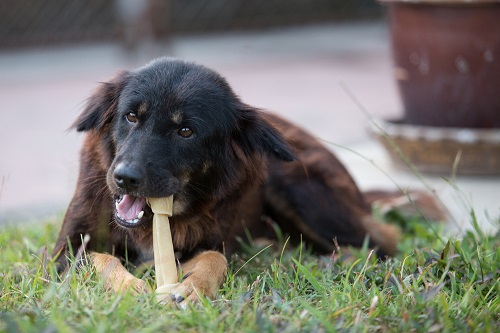Can Dogs Eat Gums? What to Do If Your Dog Accidentally Eats Gum? Let’s find answers and information to these questions!
Can Dogs Eat Gums? If you are wondering about this and also worried about the fact that if your pooch accidentally ingests it, then keep on reading!
What is a Gum?

Gum is a type of confectionery product that is chewed for its flavor and sweetness. It is made from a combination of natural or artificial sweeteners, flavors, colors, and a soft, rubbery base material such as chicle, a natural latex harvested from the sapodilla tree.
Chewing gum is most commonly used as a breath freshener, but it can also be used to relieve stress, boredom, or hunger.
Can Dogs Eat Gums?
No, dogs should not eat gums. Gums contain sugar and other artificial sweeteners that can cause digestive issues in dogs. Additionally, large chunks of gum can be a choking hazard.
What Happens if Your Dog Accidentally Eats Gum?
If a dog ingests gum, it can result in digestive issues like blockages in the digestive tract and discomfort. Ingestion of gum containing xylitol can lead to hypoglycemia in dogs, which can be serious.
Symptoms such as vomiting, diarrhea, abdominal pain, lethargy, and lack of coordination may occur.
It is important to promptly seek veterinary attention if you suspect your dog has ingested gum. The vet may opt for induced vomiting, x-rays, or surgery, depending on the severity.
What is Xylitol Poisoning in Dogs?
Xylitol poisoning in dogs is a condition caused by the ingestion of xylitol, a sugar substitute commonly found in sugar-free gum, candies, baked goods, and other products.
It is toxic to dogs and can cause a rapid release of insulin, leading to hypoglycemia (low blood sugar) within as little as 30 minutes after ingestion.
Symptoms of xylitol poisoning in dogs may include vomiting, loss of coordination, seizures, and in severe cases, liver failure.
Xylitol poisoning can be life-threatening to dogs. So, it is necessary to be cautious.
Treatment for Xylitol Poisoning
The treatment for xylitol poisoning in dogs typically involves supportive care and management of symptoms. The following are some of the common steps taken by veterinarians in the treatment of xylitol poisoning:
- Inducing vomiting: If the ingestion of xylitol is recent, the vet may induce vomiting to remove the toxin from the digestive system.
- Activated charcoal: The vet may administer activated charcoal to help absorb any remaining xylitol in the digestive tract.
- Monitoring blood sugar levels: Xylitol can cause hypoglycemia (low blood sugar), so monitoring and maintaining the dog’s blood sugar levels is important. The vet may administer glucose or other sugar sources intravenously to raise blood sugar levels.
- Liver support: In severe cases, xylitol can cause liver failure, so the vet may provide liver support to protect liver function.
- Hospitalization: In some cases, dogs may need to be hospitalized for observation, supportive care, and treatment.
It is important to seek veterinary care immediately if you suspect your dog has ingested anything containing xylitol.
The Dangers of Dogs Eating Gum
Eating gum can be dangerous for dogs as it can cause digestive issues such as blockages and discomfort. Some gums contain xylitol which can be toxic and cause rapid insulin release, leading to hypoglycemia (low blood sugar) and potentially life-threatening liver failure.
Symptoms of gum ingestion may include vomiting, diarrhea, abdominal pain, lethargy, and loss of coordination.
What Should You Do If Your Dogs Accidentally Eat Gum?
If your dog accidentally eats gum, you should seek veterinary care immediately. Time is critical in treating gum or xylitol ingestion, and prompt action can improve the chances of a positive outcome.
The vet may induce vomiting, administer activated charcoal, monitor blood sugar levels, provide liver support, and hospitalize the dog if necessary. Simple Prevention You Should Opt For?
To prevent your dog from accidentally eating gum and other xylitol-containing products, you should follow these simple steps:
- Store gum and other xylitol-containing products out of reach of pets.
- Read labels carefully and avoid products that contain xylitol.
- Do not offer gum or other xylitol-containing products to your dog, even as a treat.
- Be mindful when eating or using xylitol-containing products and dispose of them properly.
- Educate others in your household about the dangers of xylitol to dogs.
Is there Any Type of Gum that Dogs Can Eat?
No, dogs should not eat gum. Most types of gum contain xylitol, a sugar substitute that is toxic to dogs and can cause serious health problems, including vomiting, seizures, and liver failure.
What About Friendly Dog Chews?

Some popular dog-friendly chews include:
- Rawhide bones
- Nylabone chew toys
- Kong classic chew toys
- Greenies dental chews
- Bully sticks
- Jerky treats
It’s important to supervise your dog when giving them any chew and always choose the appropriate size for their breed and chewing habits. Always avoid giving your dog chews that are small enough to be a choking hazard.
Quick Takeaways
Gum and xylitol can be harmful and cause digestive issues and xylitol poisoning. Xylitol poisoning can lead to hypoglycemia and liver failure; seek a vet immediately.
You should always store gum and xylitol products out of reach, read labels and avoid xylitol.
Must Read:
- Can Dogs Eat Arugula | How to Feed Arugula to Dogs
- Can Dogs Eat Jasmine Rice | Is Jasmine Rice Safe for Dogs

